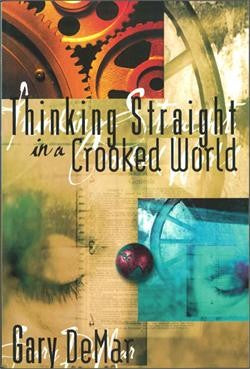Gary discusses the current movie, Jesus Revolution, which tells the story of the Jesus Movement in the late 1960s and early 1970s.
It is upon a final standard—a standard to which no greater appeal is made—that all worldviews rest.[1] What we are looking for in our apologetic task is a reliable gauge of truth that does not depend on the fallible, finite, and fallen character of man for validation. What we need is an authoritative touchstone by which all other claims to ultimate authority can be tested:
In the days of the gold rush men used a touchstone, a fine grained dark stone, such as jasper, to determine the quality of the gold which they had discovered. Today a Geiger counter is used to locate uranium and other precious metals. In baseball the umpire makes the decisions in the contest between the pitcher and the batter. In the courtroom the judge decides questions of law. In their respective fields the touchstone, the Geiger counter, the umpire and the judge speak with authority.[2]
But even these are not ultimate authorities. More fundamental principles and guidelines stand behind these measuring devices. The umpire is bound by a rule book. A group of men determine the rules that are finally published in the book. But the very idea that there are objective rules is fundamental to the entire process. Where do the concepts of value, right and wrong, rules, and the principle of judgment come from? Where do these precepts find their validity so that people generally follow them with little or no argument? How does one account for such abstractions in a materialistic universe? Are they made up? Do they change from generation to generation? When it comes to the most important questions about life and death…
· Who am I?
· What am I?
· Why am I here?
· Does God exist?
· If God does exist, how can I know him? · What happens to me after death?
· How should I live my life?
· Are there moral absolutes?
· Does life have meaning?
. . . we want and need reliable and authoritative answers. To answer these questions (and many others like them) with certainty and authority, an ultimate and reliable standard must be found. For centuries, philosophers have embarked on such a quest. How successful have they been? If the history of philosophy is any indicator, the results are at best mixed. From platonism to post-modernism, from Aristotle to Zoroaster, each view of the world seemingly contradicts every other view.

Thinking Straight in a Crooked World
The nursery rhyme ‘There Was a Crooked Man’ is an appropriate description of how sin affects us and our world. We live in a crooked world of ideas evaluated by crooked people. Left to our crooked nature, we can never fully understand what God has planned for us and His world. God has not left us without a corrective solution. He has given us a reliable reference point in the Bible so we can identify the crookedness and straighten it.
Buy NowGary discusses the current movie, Jesus Revolution, which tells the story of the Jesus Movement in the late 1960s and early 1970s. While not a review of either the movie or the movement, Gary laments the shallowness of what was taught (or not taught) by this captive audience of new believers more than 50 years ago. Had a comprehensive biblical worldview been taught, we may be in a completely different situation today.
Click here for today’s episode
Click here to browse all episodes of The Gary DeMar Podcast
[1] Greg L. Bahnsen, Always Ready: Directions for Defending the Faith (Texarkana, AR: Covenant Media Foundation, 1996), 70–75.
[2] George M. Marston, The Voice of Authority (Nutley, NJ: Presbyterian and Reformed, 1960), xv.

